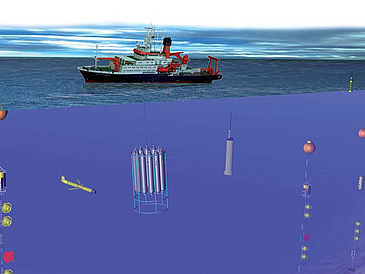Record-breaking floods in Central Europe, record-breaking temperatures in North America, an early storm season in the Atlantic region: This summer has included immense weather extremes. It is almost certain that the ever more frequent extreme weather events are a result of climate change. With continually increasing greenhouse gas emissions, the ocean currents in the Atlantic will most probably weaken and this will influence regional warming and the rise of the sea level, precipitation, as well as agriculture and fishing, especially in West and North Europe.
However, even the most recent climate simulations show a large fluctuation margin in the reduction of the Atlantic circulation and climate impact. Before the new ipcc report on the scientific foundations of climate change is presented on Monday, August 9, 2021, the German Marine Research Consortium (KDM) and the German Climate Consortium (DKK) will publish a background brochure on the measuring of climate-relevant Atlantic circulation. It illustrates how scientists survey the oceans to obtain the necessary data.
Measuring Stations in the Deep Sea
Professor Monika Rhein from the University of Bremen explains: “In order to find out how close the reduction of ocean currents in the climate models are to reality, we need long-term data from said currents that span over several decades. The required measurements need to be taken and recorded.”
The leading German marine research institutes operate measuring stations in the deep sea that record the currents from the Arctic to the South Atlantic. The methods are described clearly in the brochure and how the observations are connected to the models is also explained. The Atlantic circulation data is integrated in the IPCC reports so that the facts for global and science-based policy to protect the oceans and atmosphere are available.
For several years, Monika Rhein has coordinated the network of research institutes that take these measurements. The University of Bremen and MARUM – Center for Marine Environmental Sciences have also contributed to a better understanding of the oceans with their research projects and observatories. The University of Bremen’s measurements span from Newfoundland (Canada) across the North Atlantic to Europe. The flow of warm, saltwater from the subtropics to the North and the flow of cold, less salty water from higher latitudes to the South are the focus.
Further Information:
https://www.deutsche-meeresforschung.de/en/publications
https://www.deutsches-klima-konsortium.de/en/climate-topics.html
Contact:
Prof. Dr. Monika Rhein
University of Bremen
Institute of Environmental Physics (IUP)
MARUM – Center for Marine Environmental Sciences
Phone: +49 421 218-62160
Email: mrheinprotect me ?!uni-bremenprotect me ?!.de

